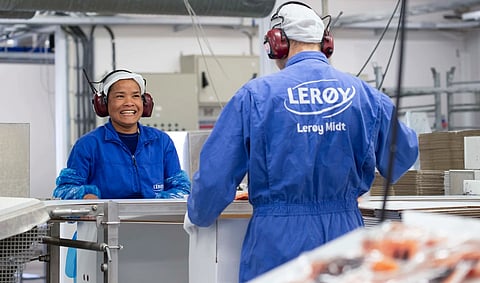

Lerøy Seafood Group has reported stable financial performance and "continued progress in biological performance" for the second quarter of 2024, reflecting the impact of various improvement measures implemented in recent years.
The company’s revenue for the quarter reached NOK 7,649 million (approximately EUR 655.8 million / USD 694.4 million), which is comparable to the same period in 2023.
However, the operational EBIT for Q2 2024 decreased slightly to NOK 906 million (EUR 77.6 million / USD 86.3 million), down from NOK 950 million in Q2 2023, primarily due to reduced quotas in the Wild Catch segment.
Lerøy's Wild Catch segment saw a significant reduction in earnings, with operational EBIT declining by NOK 103 million compared to the same period last year. This drop was largely attributed to lower quotas, which have affected the segment's operating basis.
"The outlook for wild catch is very challenging due to significant quota reductions in recent years. The quota advice for 2025 indicates further cuts. This development is undoubtedly challenging for this part of our business," Beltestad said.
However, Lerøy’s downstream operations and value-added processing, sales, and distribution (VAPS&D) segments continued to show positive development.
The Value-Added Processing, Sales & Distribution (VAP S&D) segment achieved record high earnings in Q2 2024, reporting an operational EBIT of NOK 217 million (approximately EUR 18.6 million / USD 20.7 million). The segment's success was attributed to operational improvements and better utilization of the company's integrated value chain.
The company’s focus on biological performance within its Farming segment has also yielded good results, with significant improvements seen in key performance indicators.
Presenting the results, CEO Henning Beltestad highlighted the company's progress, noting a significant reduction in the number of sea lice treatments and substantial improvements in both growth and survival rates compared to the average over the past five years.
"The positive trend in biological performance has continued into the second quarter, and we are performing well in a quarter characterized by declining salmon prices," Beltestad stated.
The company’s Farming segment, which operates across three regions in Norway, reported an operational EBIT of NOK 777 million (EUR 66.6 million / USD 74 million) for Q2 2024, a slight increase from NOK 767 million in Q2 2023.
The segment harvested 37,000 tonnes during the quarter, marking a 24% increase compared to Q2 2023. Notably, the average harvest weight improved, with the Group achieving an average of 4.7 kg per fish (gutted weight) compared to 3.9 kg in the same quarter last year. Earnings per share before fair value adjustments related to biological assets for Q2 2024 were NOK 0.77, compared with NOK -2.11 in Q2 2023.
The Farming segment’s contract share for salmon was 44% in Q2 2024, with Lerøy Sjøtroll, one of the company’s key farming regions, reporting a 34% harvest volume share of trout. Lerøy Midt and Lerøy Sjøtroll, two of the Group’s farming regions, have also shown significant improvements in biological performance, with new technologies like submersible cages contributing to better outcomes.
In addition to biological advancements in Norway, Lerøy's Scottish Sea Farms division (a joint venture with SalMar) also delivered notable improvements, resulting in a significant increase in profit compared to the previous year, reaching (EUR 4.5m / USD 4.7m) - a reversal of fortunes compared with last year, which saw a loss of NOK -65 million in Q2 2023.
Over the past five years, the company has been exploring innovative solutions to tackle one of the industry's most persistent challenges: sea lice.
Beltsetad said that in August, the company completed its first harvest of salmon from submerged cages, a technology that shows promising potential for the future of Lerøy.
"This innovative technology is showing very promising results, and we believe it will be an important growth driver for Lerøy going forward," he said.
Looking ahead, Lerøy expects continued good biological development for the remainder of 2024, and says it is on track to meet its ambitious goals 2025 goals for both farming and VAP S&D.
The Group anticipates that costs per kilo of fish harvested will be lower in the second half of the year compared to the first half, despite the inflationary pressure caused by the weaker Norwegian krone.
"We are focused on improving roe and smolt quality, implementing new farming technologies, and optimizing processes. There is growing demand for an integrated value chain with a strong sustainability profile, and we see significant potential to boost earnings in our European downstream operations," Beltestad concluded.
